The history of Brunei concerns the settlements and societies located on the north coast of the island of Borneo, which has been under the influence of Indianised kingdoms and empires for much of its history. Local scholars assume that the Islamisation of Brunei started in the fifteenth century, with the formation of the Bruneian Empire, a thalassocracy which covered the northern part of Borneo and the southern Philippines. At the end of the 17th century, Brunei subsequently entered a period of decline brought on by Brunei Civil War, piracy, and European colonial expansion. Later, there was a brief war with Spain, in which Brunei lost Manila and evacuated their capital for a brief period until the Spanish withdrew. The empire lost much of its territory with the arrival of the Western powers, such as the Spanish in the Philippines and the British in Labuan, Sarawak, and North Borneo. The decline of the Bruneian Empire accelerated in the nineteenth century when Brunei gave much of its territory to the White Rajahs of Sarawak, resulting in its current small landmass and separation into two parts. Sultan Hashim Jalilul Alam Aqamaddin later appealed to the British to stop further annexation in 1888. In the same year, the British signed a "Treaty of Protection" and made Brunei a British protectorate until 1984 when it gained independence and prospered due to the discovery of oil.

Christianity is a minority religion in Malaysia. In the 2020 census, 9.1% of the Malaysian population identified themselves as Christians. About two-thirds of Malaysia's Christian population lives in East Malaysia, in the states of Sabah and Sarawak. Adherents of Christianity represent majority (50.1%) of the population in Sarawak, which is Malaysia's largest state by land area. Christianity belief is one of four major religion other than Islam, Hinduism, and Buddhism that has a freedom protected by the law in Malaysia based of diversity law especially in East Malaysia.

Bidayuh is the collective name for several indigenous groups found in southern Sarawak, Malaysia and northern West Kalimantan, Indonesia, on the island of Borneo, which are broadly similar in language and culture. The name Bidayuh means 'inhabitants of land'. Originally from the western part of Borneo, the collective name Land Dayak was first used during the period of Rajah James Brooke, the White Rajah of Sarawak. At times, they were also lesser referred to as Klemantan people. They constitute one of the main indigenous groups in Sarawak and West Kalimantan and live in towns and villages around Kuching and Serian in the Malaysian state of Sarawak, while in the Indonesian province of West Kalimantan they are mainly concentrated in the northern Sanggau Regency. In Sarawak, most of Bidayuh population can be found within 40 km of the geographical area known as Greater Kuching, within the Kuching and Serian Division. They are the second-largest Dayak ethnic group in Sarawak after the Iban and one of the major Dayak tribes in West Kalimantan.

The Church of the Province of South East Asia is an autonomous member of the Anglican Communion, created in 1996 with the four dioceses of Kuching, Sabah, Singapore and West Malaysia.
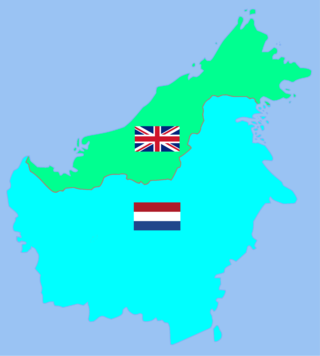
British Borneo comprised the four northern parts of the island of Borneo, which are now the country of Brunei, two Malaysian states of Sabah and Sarawak, and the Malaysian federal territory of Labuan. During the British colonial rule before World War II, Sarawak was known as the Raj of Sarawak (1841–1946), Sabah was known as North Borneo (1881–1946), and Labuan was known as the Crown Colony of Labuan (1848–1946). Between World War II and their independence from Britain, Sarawak became the Crown Colony of Sarawak (1946–1963) whereas Sabah and Labuan combined to form the Crown Colony of North Borneo (1946–1963). The Kingdom of Brunei (1888/1906-1984) was a protectorate of the United Kingdom since the 1888/1906 Protectorate Agreement, and was known as British Protectorate State of Brunei.

The Raj of Sarawak, also Kingdom of Sarawak or State of Sarawak, located in the northwestern part of the island of Borneo, was an independent state with a treaty of protection with United Kingdom starting from 1888. It was established as an independent state from a series of land concessions acquired by an Englishman, James Brooke, from the Sultan of Brunei. Sarawak was recognised as an independent Sovereign state by the United States in 1850 and by the United Kingdom in 1864. The Kingdom is now the Malaysian state of Sarawak.
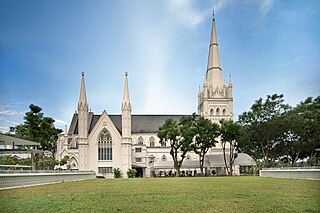
The Diocese of Singapore is a diocese of the Province of the Anglican Church in South East Asia consisting of 27 Anglican parishes in Singapore and 6 deaneries throughout the Asia region. It has an established history of church-planting as well as providing educational, medical and social services in Singapore and the neighbouring region. The Diocese of Singapore is in communion with the See of Canterbury. St Andrew's Cathedral is the cathedral church of the diocese.
John Chew Hiang Chea was the third Metropolitan Archbishop and Primate of the Province of Anglican Church in South East Asia as well as Bishop of Singapore. He retired as the 8th Bishop of Singapore on 4 October 2012. He was succeeded by Rennis Ponniah.
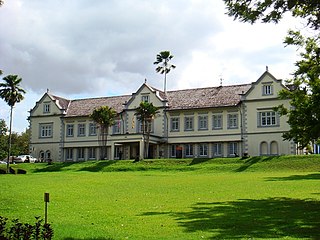
The Sarawak State Museum is the oldest museum in Borneo. It was founded in 1888 and opened in 1891 in a purpose-built building in Kuching, Sarawak.
Sabah Theological Seminary (STS) is an interdenominational Protestant seminary located in the town of Kota Kinabalu, Sabah, East Malaysia.
The Diocese of Kuching is a diocese of the Anglican Church of the Province of South East Asia that covers Sarawak and Brunei. Founded in 1962, the see was originally established as the Bishopric of Sarawak linked to the Diocese of Labuan in 1855. The current bishop is the Most Rev'd Danald Jute, 14th Lord Bishop of the Diocese of Kuching and Brunei, who was consecrated on 13 August 2017. His seat is at St. Thomas' Cathedral, Kuching.
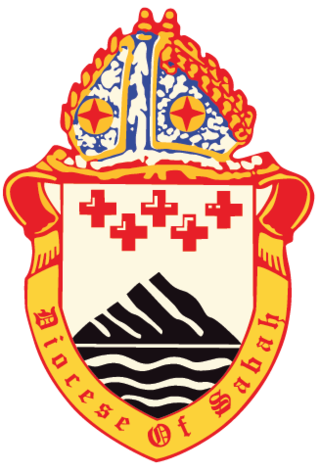
The Diocese of Sabah is an Anglican diocese which covers Sabah and Labuan in Malaysia. Founded in 1962, the see was originally part of the much larger Diocese of Labuan and its Dependencies which was established in 1855. Following the carving out of the Diocese of Singapore in 1909 from this last ecclesiastical territory, the area of the present-day Diocese fell under the jurisdiction of the Diocese of Labuan & Sarawak, which was reorganised as the Diocese of Borneo in 1949. In 1962, the latter diocese was divided into two, forming the Diocese of Kuching and the Diocese of Jesselton, which was renamed the Diocese of Sabah when the capital city was given the new name of Kota Kinabalu in 1967.
The Bishop of Sabah is an Anglican prelate who oversees the Diocese of Sabah in the Church of the Province of South East Asia. Following the death of Albert Vun Cheong Fui on 14 July 2014, Melter Tais was installed as the sixth bishop on 14 May 2015. His seat is All Saints' Cathedral, Kota Kinabalu.

The Diocese of West Malaysia is an Anglican diocese which covers the entire West Malaysia. The Diocese of West Malaysia (DWM) was founded on 8 April 1970, as DWM together with Diocese of Singapore split from Diocese of Singapore and Malaya. As a result, Diocese of Singapore and Malaya was dissolved.
The Borneo Evangelical Mission was a Protestant Evangelical Christian missionary society that worked among the people of Borneo, Malaysia. It was founded in October 1928 by three Australian missionaries, Hudson Southwell (Baptist), Frank Davidson (Anglican) and Carey Tolley. In 1975 the BEM merged with Overseas Missionary Fellowship.

The Council of Churches of Malaysia (CCM) is an ecumenical fellowship of Churches and Christian organisations in Malaysia. It is one of the three constituent members of the Christian Federation of Malaysia.
Francis Septimus Hollis was a British clergyman in the Anglican Church. He held the position of Bishop of Labuan and Sarawak in Southeast Asia from 1938 until 1948.
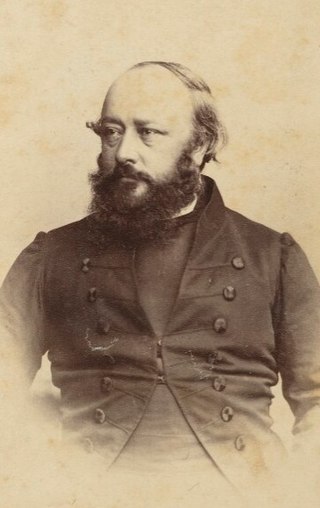
Francis Thomas McDougall was the first Bishop of Labuan and Sarawak from 1849 to 1868.
Bolly anak Lapok was the fourth Metropolitan Archbishop and Primate of the Anglican Church of the Province of South East Asia as well as the Bishop of Kuching.
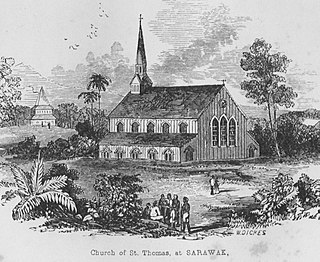
The Bishop of Kuching is the ordinary of the Anglican Diocese of Kuching in the Church of the Province of South East Asia. The bishop exercises episcopal authority over Anglican churches in the Malaysian state of Sarawak and in the independent nation of Brunei Darussalam.











